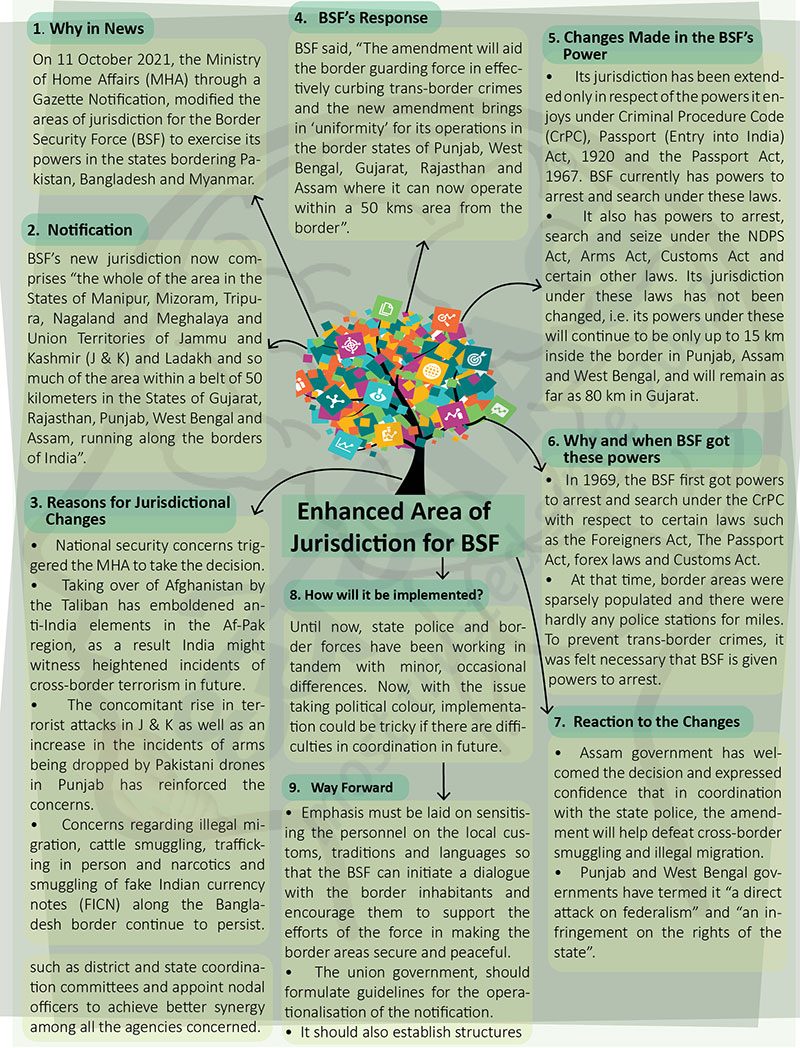Brain-booster /
17 Jan 2022
Brain Booster for UPSC & State PCS Examination (Topic: Enhanced Area of Jurisdiction for BSF)

Why in News?
- On 11 October 2021, the Ministry of Home Affairs (MHA) through a Gazette
Notification, modified the areas of jurisdiction for the Border Security
Force (BSF) to exercise its powers in the states bordering Pakistan,
Bangladesh and Myanmar.
Notification
- BSF’s new jurisdiction now comprises “the whole of the area in the
States of Manipur, Mizoram, Tripura, Nagaland and Meghalaya and Union
Territories of Jammu and Kashmir (J & K) and Ladakh and so much of the area
within a belt of 50 kilometers in the States of Gujarat, Rajasthan, Punjab,
West Bengal and Assam, running along the borders of India”.
Reasons for Jurisdictional Changes
- National security concerns triggered the MHA to take the decision.
- Taking over of Afghanistan by the Taliban has emboldened anti-India
elements in the Af-Pak region, as a result India might witness heightened
incidents of cross-border terrorism in future.
- The concomitant rise in terrorist attacks in J & K as well as an
increase in the incidents of arms being dropped by Pakistani drones in
Punjab has reinforced the concerns.
- Concerns regarding illegal migration, cattle smuggling, trafficking in
person and narcotics and smuggling of fake Indian currency notes (FICN)
along the Bangladesh border continue to persist.
BSF’s Response
- BSF said, “The amendment will aid the border guarding force in
effectively curbing trans-border crimes and the new amendment brings in
‘uniformity’ for its operations in the border states of Punjab, West Bengal,
Gujarat, Rajasthan and Assam where it can now operate within a 50 kms area
from the border”.
Changes Made in the BSF’s Power
- Its jurisdiction has been extended only in respect of the powers it
enjoys under Criminal Procedure Code (CrPC), Passport (Entry into India)
Act, 1920 and the Passport Act, 1967. BSF currently has powers to arrest and
search under these laws.
- It also has powers to arrest, search and seize under the NDPS Act, Arms
Act, Customs Act and certain other laws. Its jurisdiction under these laws
has not been changed, i.e. its powers under these will continue to be only
up to 15 km inside the border in Punjab, Assam and West Bengal, and will
remain as far as 80 km in Gujarat.
Why and when BSF got these powers
- In 1969, the BSF first got powers to arrest and search under the CrPC
with respect to certain laws such as the Foreigners Act, The Passport Act,
forex laws and Customs Act.
- At that time, border areas were sparsely populated and there were hardly
any police stations for miles. To prevent trans-border crimes, it was felt
necessary that BSF is given powers to arrest.
Reaction to the Changes
- Assam government has welcomed the decision and expressed confidence that
in coordination with the state police, the amendment will help defeat
cross-border smuggling and illegal migration.
- Punjab and West Bengal governments have termed it “a direct attack on
federalism” and “an infringement on the rights of the state”.
How will it be implemented?
- Until now, state police and border forces have been working in tandem
with minor, occasional differences. Now, with the issue taking political
colour, implementation could be tricky if there are difficulties in
coordination in future.
Way Forward
- Emphasis must be laid on sensitising the personnel on the local customs,
traditions and languages so that the BSF can initiate a dialogue with the
border inhabitants and encourage them to support the efforts of the force in
making the
border areas secure and peaceful.
- The union government, should formulate guidelines for the
operationalisation of the notification.
- It should also establish structures such as district and state
coordination committees and appoint nodal officers to achieve better synergy
among all the agencies concerned.























